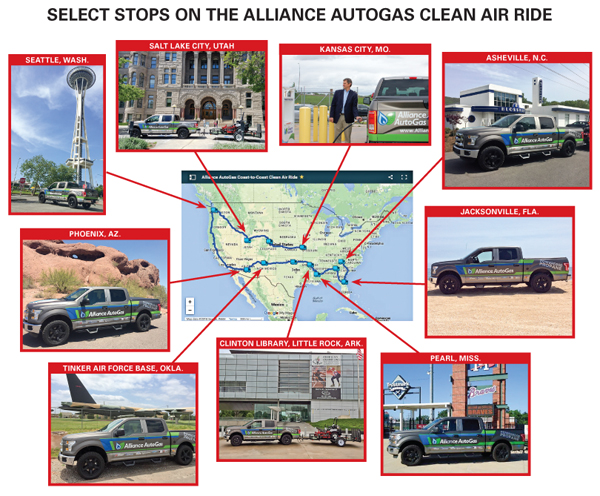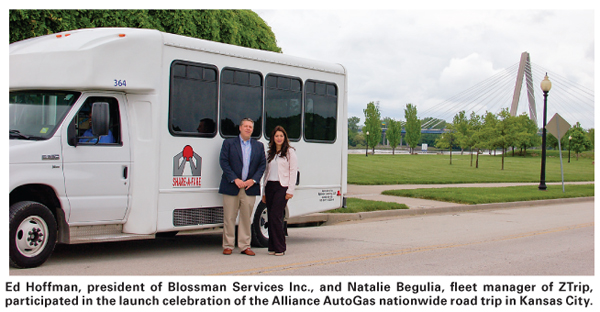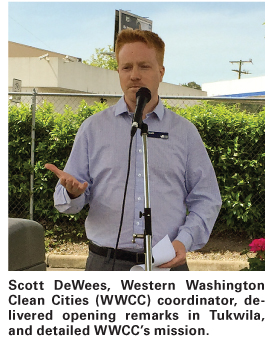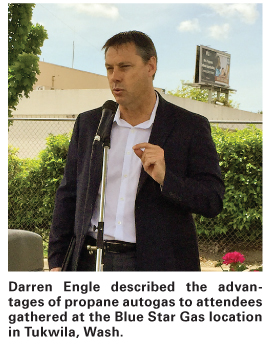Wednesday, June 8, 2016
The “Show Me” state proved a scenic locale for the launch celebration of the Alliance AutoGas Coast-to-Coast Clean Air Ride. With the Heart of America Bridge and Missouri River as backdrops, the 5700-mile road trip embarked May 2 from the Richard L. Berkley Riverfront Park in Kansas City, Mo. The vehicle arrived back to its home at the AutoGas Research & Technology Center in Asheville, N.C. on May 23, after traveling the country for three weeks, spreading the word on cleaner air and lowering emissions. 
On the heels of achieving what Alliance AutoGas said was the fastest recorded alternative fuel conversion to propane autogas at the 2016 Work Truck Show (92 minutes), the Alliance AutoGas Ford F-150 set off on a 12-city tour to “travel the talk” of the real economic and environmental benefits gained by the use of autogas. The Coast-to-Coast Clean Air Ride traveled across the country making scheduled stops in Fort Collins, Colo.; Salt Lake City, Utah; Seattle; Phoenix; Albuquerque; Oklahoma City; Little Rock; Jackson, Miss.; Decatur, Ga.; and its last stop in Jacksonville, Fla. before heading back to Asheville, N.C., for a homecoming celebration at Alliance AutoGas headquarters.
Representatives from several autogas-related organizations gathered for the chilly Kansas City launch including Mark Denton, Alliance AutoGas’ vice president, business development (shown fueling up in Kansas City), who also logged miles as the driver on the first leg of the journey through western Kansas to Colorado.
Denton invited guests to view the F-150 up close, as well as the propane mower that was towed behind and had been converted to propane by Alliance Small Engines. Several city stops included mowing demonstrations scheduled at golf courses, universities, sports stadiums, and other institutions that have sought to improve economics and air quality, as well as meet their commitment to be good corporate citizens.
Ed Hoffman, president, Blossman Services Inc., parent company and equipment supplier of Alliance AutoGas, remarked, “We want fleet managers and people we encounter along the way to see firsthand how simple and easy it is to convert vehicles to autogas, how well they run, their extended range, and the significant economic and environmental benefits of propane autogas vehicles.”
Kelly Gilbert, director of the Kansas City Regional Clean Cities Coalition and host partner, emceed the event, remarking, “It’s about time we had a little pomp and circumstance about propane autogas. It is the third most common transportation fuel across the globe, and America’s heartland is the perfect place to kick off this Coast-to-Coast trip. With our city’s reputation for embracing cutting-edge energy and information technology, the ‘Show Me’ state is a great place to launch the Clean Air Ride and ‘show’ people that vehicle engine technology is always improving to impact our lives for the better.”
 Kansas City Regional Clean Cities Coalition executive director David Albrecht added that in the last several years Kansas City has seen a number of public and private fleets, school buses, and other vehicles adopt autogas as their preferred fuel for fleet operations. Metropolitan Energy Center (the nonprofit host of Kansas City Regional Clean Cities Coalition) executive director Warren Adams-Leavitt cited a study that shows the Unified Government of Wyandotte County and Kansas City, Kan. saved taxpayers more than $80,000 in fuel costs last year by using propane autogas. With some up-front assistance from their propane provider, the Unified Government’s initial investment to install the propane autogas infrastructure was a mere $3000, a fraction of a minimum $400,000 cost to install fast-fill CNG infrastructure.
Kansas City Regional Clean Cities Coalition executive director David Albrecht added that in the last several years Kansas City has seen a number of public and private fleets, school buses, and other vehicles adopt autogas as their preferred fuel for fleet operations. Metropolitan Energy Center (the nonprofit host of Kansas City Regional Clean Cities Coalition) executive director Warren Adams-Leavitt cited a study that shows the Unified Government of Wyandotte County and Kansas City, Kan. saved taxpayers more than $80,000 in fuel costs last year by using propane autogas. With some up-front assistance from their propane provider, the Unified Government’s initial investment to install the propane autogas infrastructure was a mere $3000, a fraction of a minimum $400,000 cost to install fast-fill CNG infrastructure.
In addition to prudent economics, the Unified Government has displaced more than 35,000 gallons of diesel, reducing greenhouse gas emissions and black carbon particulate matter that negatively impacts lung health and air quality. The Unified Government was so pleased with its propane autogas vehicles it has increased its shuttle fleet, added 10 Ford F-250 Super Duty trucks to its Public Works Department fleet, and four additional transit buses.
Natalie Begulia, fleet manager of ZTrip (a company of Kansas City Transportation Group [KCTG] and TransDev/Veolia), described the collaboration between KCTG, Alliance AutoGas, and Ferrellgas in implementing the company’s fleet transition to propane autogas. Begulia described the ease of the “plug-and-play” Alliance conversion process undertaken on 35 propane-powered transit vans and sedans in the region’s Share-a-Fare program, as well as the installation of its centrally-located refueling station that includes an 18,000-gal. storage tank and two Alliance AutoGas’ refueling dispensers with state-of-the-art Staubli safety nozzles.
Guests from Ferrellgas included Nathan Ediger, director of autogas, who was instrumental in the KCTG refueling infrastructure, and other area public and private fleets. Micah Redman, senior vice president, strategic accounts, and Jon Favrow, manager autogas administration, also were in attendance. FerrellAutogas provides the fuel and helped build the refueling infrastructure for many Kansas City area fleets that have converted to propane autogas, as well as fleets nationwide.
Alliance AutoGas and its Clean Cities host partners held special events in cities chosen to meet a strategic objective. For instance, Phoenix was selected because it is home to one of Alliance AutoGas’ Coast-to-Coast Clean Air Ride corporate sponsors, thyssenkrupp, and its fleet of propane autogas vehicles. Phoenix is also one of several cities that only allow low-emission, alternative-fueled vehicles under an airport canopy. Events provided opportunities to educate and demonstrate to the public, and the media, facts, statistics, and case studies that illustrate why propane autogas is a superior fuel choice. A “show and tell” activity provided participants the opportunity to get a close look at the Alliance AutoGas Bi-fuel 2016 3.5-liter Ford F-150 V-6. Clean Cities updated attendees about autogas projects in their areas, and local fleet managers shared their experiences operating autogas fleets with the Alliance AutoGas engineered fuel system.
In closing remarks, Hoffman noted, “It’s time. The technology is available. Domestically produced propane is abundantly available. Autogas is more affordable and more environmentally friendly. There is no reason not to embrace propane autogas. The cross country trip in Alliance AutoGas’ Ford F-150 is a great opportunity to demonstrate why propane autogas will soon be the world’s No. 1 alternative fuel.”
On the Road… Again…
The fourth stop of the road trip included an event in Tukwila, Wash., hosted at Blue Star Gas, an Alliance AutoGas network partner, and co-hosted by Western Washington Clean Cities.
Scott DeWees, Western Washington Clean Cities (WWCC) co-coordinator, delivered opening remarks, pointing out that WWCC is a national organization dedicated to expanding the use of alternative fuels and advancing vehicle technologies. “Propane is the fastest-growing alternative fuel in Western Washington both by volume of petroleum fuel displacement and by the number of fleets piloting it within their organizations.”
“Alliance AutoGas set the record for the fastest autogas conversion at the 2016 Work Truck Show, and now they’re driving the vehicle from coast to coast to demonstrate its utility and reliability. [The Coast-to-Coast Clean Air Ride] strikes me as a powerful metaphor for the ease at which this technology is readily adoptable to today’s fleet vehicles and operational needs,” remarked DeWees. He added that propane is available across the U.S.; the western Washington region already has 30 public fueling stations that include propane autogas. “The rate at which we are displacing gasoline and diesel with cleaner, more economical propane autogas is very exciting,” continued DeWees.
“Currently the U.S. uses 5 billion barrels of oil per year for transportation. It would take 1400 super tanker deliveries to move that quantity of oil. To give a visual idea of how much that is, if you lined up 1400 super tankers from end to end, they would stretch from Seattle to Redding, California. With 95% of propane generated in the U.S., we can reduce our dependence on foreign oil, which means U.S. energy and national security become more secure,” he added.
“Autogas is now the fastest-growing alt fuel in the western Washington area,” noted DeWees. Fleets include Super Shuttle, UPS, Sears, thyssenkrupp, Washington State Department of Transportation, Frito-Lay, Master Park Airport Valet & Parking, Keystone Automotive, Shuttle Express, and many school bus fleets, among others.
Darren Engle, director of government relations for Blue Star Gas, an Alliance AutoGas network partner and Clean Air Ride event host, further detailed advantages of propane autogas. “Traditionally, propane autogas is 30% to 50% less expensive than gasoline or diesel. And, the fueling infrastructure is the least expensive of any transportation fuel to install, operate, and maintain,” stated Engle. Alternative fuel tax incentives are available in many states. Washington businesses can receive tax credits up to $20,000 for purchasing new commercial vehicles or converting existing vehicles to autogas. Converted models do not violate a vehicle’s factory warranty. Blue Star Gas has invested $2 million on infrastructure and has 35 refueling locations in Oregon, Washington, Utah, and Arizona. “With its proven superiority on every level, and with virtually all vehicle models available, it’s time to break our nation’s addiction to gasoline and diesel,” noted Engle.
Engle went on to describe the measurable outcomes seen in the region from displacing gas and diesel fleets with autogas, adding it is more than just economic. In a city plagued with traffic congestion and increasing air pollution, Engle noted that autogas reduces greenhouse gas emissions by 25% compared to gasoline, and produced 80% less hydrocarbons than a diesel vehicle, dramatically improving air quality.
Several years ago, as Seattle fleet owners began to seek out healthier and more affordable fuel solutions, Seattle Children’s Hospital took the lead by converting its fleet of shuttle buses to autogas. In addition to shuttling patients and employees to and from parking lots, shuttle service includes off-campus locations, according to Engle. Two shuttles run between the hospital campus and Children’s Met Park West site in downtown Seattle. The Seattle Cancer Care Alliance shuttle also runs every 40 minutes to the University of Washington.
With less greenhouse gas emissions and pollutants such as carbon monoxide, nitrogen oxide, hydrocarbons, and particulate matter, transitioning fleets to autogas more closely aligned with the institution’s health care directive.
The final stop of the Clean Air Ride was held at Orlando, Fla.-based engineering consulting firm Universal Engineering Sciences (UES). UES served as event co-host and announced at the gathering that the company will convert 85 of its 400 vehicles to propane autogas. UES and Alliance AutoGas have collaborated on the installation of an autogas refueling station to serve UES fleets.
UES stated that converting the vehicles to propane autogas will provide the company an approximate savings of $1 per gallon, totaling $1500 in savings per vehicle annually. It received state rebates that helped offset cost. Several states make similar rebate programs available. —Andrea Young

On the heels of achieving what Alliance AutoGas said was the fastest recorded alternative fuel conversion to propane autogas at the 2016 Work Truck Show (92 minutes), the Alliance AutoGas Ford F-150 set off on a 12-city tour to “travel the talk” of the real economic and environmental benefits gained by the use of autogas. The Coast-to-Coast Clean Air Ride traveled across the country making scheduled stops in Fort Collins, Colo.; Salt Lake City, Utah; Seattle; Phoenix; Albuquerque; Oklahoma City; Little Rock; Jackson, Miss.; Decatur, Ga.; and its last stop in Jacksonville, Fla. before heading back to Asheville, N.C., for a homecoming celebration at Alliance AutoGas headquarters.
Representatives from several autogas-related organizations gathered for the chilly Kansas City launch including Mark Denton, Alliance AutoGas’ vice president, business development (shown fueling up in Kansas City), who also logged miles as the driver on the first leg of the journey through western Kansas to Colorado.
Denton invited guests to view the F-150 up close, as well as the propane mower that was towed behind and had been converted to propane by Alliance Small Engines. Several city stops included mowing demonstrations scheduled at golf courses, universities, sports stadiums, and other institutions that have sought to improve economics and air quality, as well as meet their commitment to be good corporate citizens.
Ed Hoffman, president, Blossman Services Inc., parent company and equipment supplier of Alliance AutoGas, remarked, “We want fleet managers and people we encounter along the way to see firsthand how simple and easy it is to convert vehicles to autogas, how well they run, their extended range, and the significant economic and environmental benefits of propane autogas vehicles.”
Kelly Gilbert, director of the Kansas City Regional Clean Cities Coalition and host partner, emceed the event, remarking, “It’s about time we had a little pomp and circumstance about propane autogas. It is the third most common transportation fuel across the globe, and America’s heartland is the perfect place to kick off this Coast-to-Coast trip. With our city’s reputation for embracing cutting-edge energy and information technology, the ‘Show Me’ state is a great place to launch the Clean Air Ride and ‘show’ people that vehicle engine technology is always improving to impact our lives for the better.”
 Kansas City Regional Clean Cities Coalition executive director David Albrecht added that in the last several years Kansas City has seen a number of public and private fleets, school buses, and other vehicles adopt autogas as their preferred fuel for fleet operations. Metropolitan Energy Center (the nonprofit host of Kansas City Regional Clean Cities Coalition) executive director Warren Adams-Leavitt cited a study that shows the Unified Government of Wyandotte County and Kansas City, Kan. saved taxpayers more than $80,000 in fuel costs last year by using propane autogas. With some up-front assistance from their propane provider, the Unified Government’s initial investment to install the propane autogas infrastructure was a mere $3000, a fraction of a minimum $400,000 cost to install fast-fill CNG infrastructure.
Kansas City Regional Clean Cities Coalition executive director David Albrecht added that in the last several years Kansas City has seen a number of public and private fleets, school buses, and other vehicles adopt autogas as their preferred fuel for fleet operations. Metropolitan Energy Center (the nonprofit host of Kansas City Regional Clean Cities Coalition) executive director Warren Adams-Leavitt cited a study that shows the Unified Government of Wyandotte County and Kansas City, Kan. saved taxpayers more than $80,000 in fuel costs last year by using propane autogas. With some up-front assistance from their propane provider, the Unified Government’s initial investment to install the propane autogas infrastructure was a mere $3000, a fraction of a minimum $400,000 cost to install fast-fill CNG infrastructure. In addition to prudent economics, the Unified Government has displaced more than 35,000 gallons of diesel, reducing greenhouse gas emissions and black carbon particulate matter that negatively impacts lung health and air quality. The Unified Government was so pleased with its propane autogas vehicles it has increased its shuttle fleet, added 10 Ford F-250 Super Duty trucks to its Public Works Department fleet, and four additional transit buses.
Natalie Begulia, fleet manager of ZTrip (a company of Kansas City Transportation Group [KCTG] and TransDev/Veolia), described the collaboration between KCTG, Alliance AutoGas, and Ferrellgas in implementing the company’s fleet transition to propane autogas. Begulia described the ease of the “plug-and-play” Alliance conversion process undertaken on 35 propane-powered transit vans and sedans in the region’s Share-a-Fare program, as well as the installation of its centrally-located refueling station that includes an 18,000-gal. storage tank and two Alliance AutoGas’ refueling dispensers with state-of-the-art Staubli safety nozzles.
Guests from Ferrellgas included Nathan Ediger, director of autogas, who was instrumental in the KCTG refueling infrastructure, and other area public and private fleets. Micah Redman, senior vice president, strategic accounts, and Jon Favrow, manager autogas administration, also were in attendance. FerrellAutogas provides the fuel and helped build the refueling infrastructure for many Kansas City area fleets that have converted to propane autogas, as well as fleets nationwide.
Alliance AutoGas and its Clean Cities host partners held special events in cities chosen to meet a strategic objective. For instance, Phoenix was selected because it is home to one of Alliance AutoGas’ Coast-to-Coast Clean Air Ride corporate sponsors, thyssenkrupp, and its fleet of propane autogas vehicles. Phoenix is also one of several cities that only allow low-emission, alternative-fueled vehicles under an airport canopy. Events provided opportunities to educate and demonstrate to the public, and the media, facts, statistics, and case studies that illustrate why propane autogas is a superior fuel choice. A “show and tell” activity provided participants the opportunity to get a close look at the Alliance AutoGas Bi-fuel 2016 3.5-liter Ford F-150 V-6. Clean Cities updated attendees about autogas projects in their areas, and local fleet managers shared their experiences operating autogas fleets with the Alliance AutoGas engineered fuel system.
In closing remarks, Hoffman noted, “It’s time. The technology is available. Domestically produced propane is abundantly available. Autogas is more affordable and more environmentally friendly. There is no reason not to embrace propane autogas. The cross country trip in Alliance AutoGas’ Ford F-150 is a great opportunity to demonstrate why propane autogas will soon be the world’s No. 1 alternative fuel.”
On the Road… Again…
The fourth stop of the road trip included an event in Tukwila, Wash., hosted at Blue Star Gas, an Alliance AutoGas network partner, and co-hosted by Western Washington Clean Cities.
Scott DeWees, Western Washington Clean Cities (WWCC) co-coordinator, delivered opening remarks, pointing out that WWCC is a national organization dedicated to expanding the use of alternative fuels and advancing vehicle technologies. “Propane is the fastest-growing alternative fuel in Western Washington both by volume of petroleum fuel displacement and by the number of fleets piloting it within their organizations.”

“Alliance AutoGas set the record for the fastest autogas conversion at the 2016 Work Truck Show, and now they’re driving the vehicle from coast to coast to demonstrate its utility and reliability. [The Coast-to-Coast Clean Air Ride] strikes me as a powerful metaphor for the ease at which this technology is readily adoptable to today’s fleet vehicles and operational needs,” remarked DeWees. He added that propane is available across the U.S.; the western Washington region already has 30 public fueling stations that include propane autogas. “The rate at which we are displacing gasoline and diesel with cleaner, more economical propane autogas is very exciting,” continued DeWees.
“Currently the U.S. uses 5 billion barrels of oil per year for transportation. It would take 1400 super tanker deliveries to move that quantity of oil. To give a visual idea of how much that is, if you lined up 1400 super tankers from end to end, they would stretch from Seattle to Redding, California. With 95% of propane generated in the U.S., we can reduce our dependence on foreign oil, which means U.S. energy and national security become more secure,” he added.
“Autogas is now the fastest-growing alt fuel in the western Washington area,” noted DeWees. Fleets include Super Shuttle, UPS, Sears, thyssenkrupp, Washington State Department of Transportation, Frito-Lay, Master Park Airport Valet & Parking, Keystone Automotive, Shuttle Express, and many school bus fleets, among others.
Darren Engle, director of government relations for Blue Star Gas, an Alliance AutoGas network partner and Clean Air Ride event host, further detailed advantages of propane autogas. “Traditionally, propane autogas is 30% to 50% less expensive than gasoline or diesel. And, the fueling infrastructure is the least expensive of any transportation fuel to install, operate, and maintain,” stated Engle. Alternative fuel tax incentives are available in many states. Washington businesses can receive tax credits up to $20,000 for purchasing new commercial vehicles or converting existing vehicles to autogas. Converted models do not violate a vehicle’s factory warranty. Blue Star Gas has invested $2 million on infrastructure and has 35 refueling locations in Oregon, Washington, Utah, and Arizona. “With its proven superiority on every level, and with virtually all vehicle models available, it’s time to break our nation’s addiction to gasoline and diesel,” noted Engle.

Engle went on to describe the measurable outcomes seen in the region from displacing gas and diesel fleets with autogas, adding it is more than just economic. In a city plagued with traffic congestion and increasing air pollution, Engle noted that autogas reduces greenhouse gas emissions by 25% compared to gasoline, and produced 80% less hydrocarbons than a diesel vehicle, dramatically improving air quality.
Several years ago, as Seattle fleet owners began to seek out healthier and more affordable fuel solutions, Seattle Children’s Hospital took the lead by converting its fleet of shuttle buses to autogas. In addition to shuttling patients and employees to and from parking lots, shuttle service includes off-campus locations, according to Engle. Two shuttles run between the hospital campus and Children’s Met Park West site in downtown Seattle. The Seattle Cancer Care Alliance shuttle also runs every 40 minutes to the University of Washington.
With less greenhouse gas emissions and pollutants such as carbon monoxide, nitrogen oxide, hydrocarbons, and particulate matter, transitioning fleets to autogas more closely aligned with the institution’s health care directive.
The final stop of the Clean Air Ride was held at Orlando, Fla.-based engineering consulting firm Universal Engineering Sciences (UES). UES served as event co-host and announced at the gathering that the company will convert 85 of its 400 vehicles to propane autogas. UES and Alliance AutoGas have collaborated on the installation of an autogas refueling station to serve UES fleets.
UES stated that converting the vehicles to propane autogas will provide the company an approximate savings of $1 per gallon, totaling $1500 in savings per vehicle annually. It received state rebates that helped offset cost. Several states make similar rebate programs available. —Andrea Young

